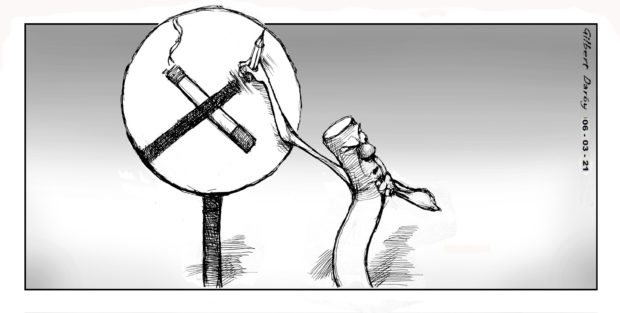‘Neither allies nor friends’

Public health advocates led by four former secretaries of the Department of Health (DOH) marked World No Tobacco Day this year with an emphatic condemnation of the tobacco industry, which they accused of employing insidious schemes to loosen tobacco control policies amid the raging COVID-19 pandemic.
In a statement of unity issued on May 30, former Health Secretaries Dr. Jaime Galvez-Tan, Dr. Carmencita Reodica, Dr. Manuel Dayrit, and Dr. Paulyn Jean Ubial — joined by more than 40 of the country’s top medical organizations led by the Philippine Medical Association as well as law group ImagineLaw, past PhilHealth chief Alexander Padilla, and former National Anti-Poverty Commission undersecretary Florencia Dorotan — said they “reject and denounce the tactics and strategies employed by the tobacco industry and their front groups seeking to relax tobacco control policies in the country.”
Article continues after this advertisement“In safeguarding Filipinos’ health, tobacco companies are neither allies nor friends,” they declared, noting that at least 117,000 Filipinos die every year from tobacco-related diseases.
The issuance of the statement was prompted by calls in Congress to strike down Joint Memorandum Circular No. 2010-01, released by the DOH and the Civil Service Commission in 2010 in line with the country’s obligations under the World Health Organization (WHO) Framework Convention on Tobacco Control.
The landmark joint circular on the “Protection of the Bureaucracy Against Tobacco Industry Interference” requires government officials to “avoid” unnecessary interaction and engagement with the tobacco industry. And in case they have to deal with them as part of regulation, supervision, and control, it must be done with transparency and accountability, to shield policymaking from the powerful influence of the moneyed tobacco industry, given its well-documented history of not only concealing evidence of addiction and harm in smoking, but also interfering with the setting and implementation of tobacco control measures.
Article continues after this advertisementDue to these and other provisions strengthening tobacco control, the joint circular was cited in 2018 as one of the “good country practices” in the implementation of the guidelines under the WHO tobacco control framework.
And yet several lawmakers are now pushing for its repeal, calling it “unlawful” and “unconstitutional,” particularly because it was used by the DOH as basis for the drafting in March of an administrative order that would have barred tobacco companies and other industries “in conflict with the interest of public health” from procuring COVID-19 vaccines.
That controversial provision in the implementing guidelines for the COVID-19 Vaccination Law, described by objecting lawmakers as an “overreach,” has since been removed. All private companies, including cigarette companies, are now allowed to purchase vaccines. As correctly pointed out by Senate Minority Leader Franklin Drilon, such a policy barring a specific industry from purchasing vaccines was “discriminatory and morally unacceptable.”
Tobacco companies, as well as producers of milk formula and alcoholic beverages, indeed have as much right as other corporations to secure vaccines for their employees and their dependents. But to go as far as to retract the 11-year-old policy protecting government bureaucracy from the considerable sway of tobacco companies is taking the correction of a clumsy move too far, and is as much an overreach if not more so.
It will be, at the very least, tantamount to dereliction of the government’s duty to promote and protect public health.
“Our Constitution declares that the Philippine government has the duty to promote and protect the public’s health,” reminded the health advocates and sectoral groups. “This duty is endangered when policies that aim to insulate government bureaucracy, officials, and policymaking from the profit-vested interests of the tobacco industry are removed, weakened or disregarded.”
The timing of the attempted easing of tobacco control policies could not be worse, with smokers shown to be more susceptible to severe COVID-19 symptoms. The virus primarily attacks the respiratory system, putting smokers with lungs and their overall health weakened by chronic tobacco use at higher risk of infection.
Thus, urged the health advocates, government leaders and legislators should “remain steadfast”; instead of loosening policies on tobacco control especially while COVID-19 is hounding the country, these should in fact be upheld and strengthened.
“There is no doubt: the move to repeal the JMC is in the interest of the tobacco industry. Removing this important wall between the Philippine bureaucracy and tobacco influence is serving Filipinos’ health on a silver platter to the tobacco industry and its profit-driven interests,” warned the former health secretaries et al. “We urge our leaders: public health over profit. Kalusugan bago kita.” This is a call lawmakers should heed.
















